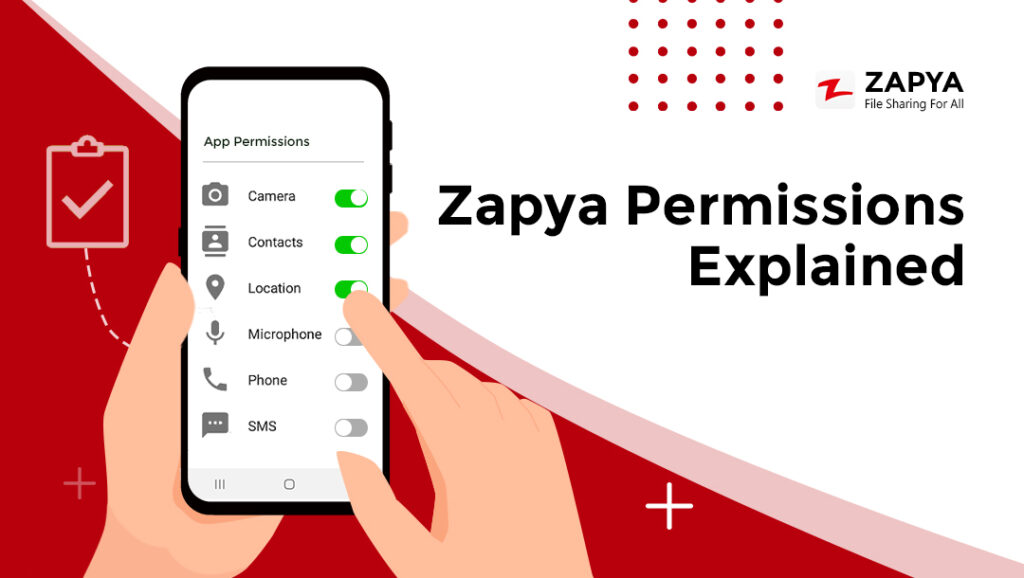Your privacy is important and what you decide to share with others is entirely up to you. You are in control of what permissions you allow applications to access. We have created this article to help you understand why we ask for certain permissions when you use Zapya. Continue reading to learn more.
We have gone through the proper channels to request permissions from you and have been authorized by the Google Play and Apple to include them on Zapya. If we did not have their authorization, Zapya would not be available on their app stores. You can learn more about the process we went through by visiting: https://support.google.com/googleplay/android-developer/answer/9214102?hl=en and https://developer.apple.com/documentation/uikit/protecting_the_user_s_privacy/requesting_access_to_protected_resources.
File sharing is the core functionality of Zapya. All the permissions we ask for are directly related to this core functionality and the other features available on Zapya. Below the permissions Zapya requests are listed in alphabetical order along with an explanations of why each of them are required.
Bluetooth
This permission is necessary to perform any Bluetooth related communication, such as creating a connection and transferring data. When an Android application uses Bluetooth related features, it is required to ask for permission to access the device’s precise location. Bluetooth uses precise location to scan for other Bluetooth devices and let other Bluetooth devices recognize your device. We are required by the Google OS and iOS to include this permission on Zapya so that you can discover nearby devices.
Call Log
The call log permission allows you to sync your phone call history across multiple devices. We have authorization from the Google Play Store to include this sensitive permission on Zapya so that users can use our phone replication feature. Our phone replication feature allows you to transfer the content of your old device over to a new one. You only need to enable this permission if you plan on using the phone replication feature.
Camera
Zapya requests access to your device’s camera so that you can scan QR codes, take photos, and record videos. If you want to receive files and join a group via QR code, Zapya needs access to your device’s camera. Also, if you want to take a photo to set as your avatar or send in a private chat, the application needs to be able to use your device’s camera.
Contacts
Zapya requests to access your device’s contact list so that you can share contact information with others. It also allows Zapya to save any contacts shared to you onto your device. When you have this permission enabled, you can transfer and/or sync your device’s contacts to another device using the phone replication feature.
Location
All file sharing applications require this permission so that they can enable Bluetooth scanning and/or Wi-Fi hotspot before establishing a connection. In simple terms, the location permission is required so that your device can connect with other devices. It is necessary to requesting a connection, receiving a connection, establishing a connection, and transferring data. Your location information is never shared with the company.
Phone State
The purpose of accessing your device’s phone state is so that Zapya can retrieve the unique device identifier and recognize if you are using mobile data or Wi-Fi. The unique device identifier is used when you are trying to share files to identify your device as one of the devices involved in the transfer. You have the option to set your connection preferences on Zapya so the app needs to know if you are using mobile data or Wi-Fi in order to comply with the preferences you have set.
Photos
This permission allows Zapya to open your device’s photo library and upload images from it. You can upload photos to Zapya to set as your avatar, send as a message in the private chat, share with others, or post on your account. For iPhone users, you have the option to control what photos Zapya can access when you have updated to iOS 14. You can select whether Zapya can access your full photo library, only photos that you select, or none.
SMS
The SMS permission allows you to sync your text messages across multiple devices. We have authorization from the Google Play Store to include this sensitive permission on Zapya so that users can use our phone replication feature. Our phone replication feature allows you to transfer the content of your old device over to a new one. You only need to enable this permission if you plan on using the phone replication feature.
Storage
Zapya requests access to your device’s storage so that it can identify all files saved to that device so that you can share them with others. It is your decision whether or not you wish to share certain files with others. This permission also allows for Zapya to save files that have been transferred to you onto your device. If this permission is disabled, you will be unable to use the core features of Zapya.
If you wish to learn more, please read our Privacy Policy (https://zapya.app/policy_en.html) and our Terms of Service (https://zapya.app/v3/terms_of_service.html). Please contact us if you have any questions or concerns. You can contact us by leaving a comment on this article or emailing us at feedback@dewmobile.net.
You may also like
-
A Seamless Connection: Step-by-Step Guide to Transferring Files from Mobile to PC with Zapya Webshare
-
Exploring the Seamless Connectivity of Zapya Go: Unleashing a World of Features
-
Historic Triumph: Iraqi Football Team Stuns Japan in Asian Cup
-
Zapya app ကိုအသုံးပြုတဲ့ user များအားလုံးကို ကျေးဇူးတင်ရှိပါတယ်ရှင့်❤️
-
یلدای ۱۴۰۲ مبارک


Nice
Thank you for allowing me to be effective user of zapya.